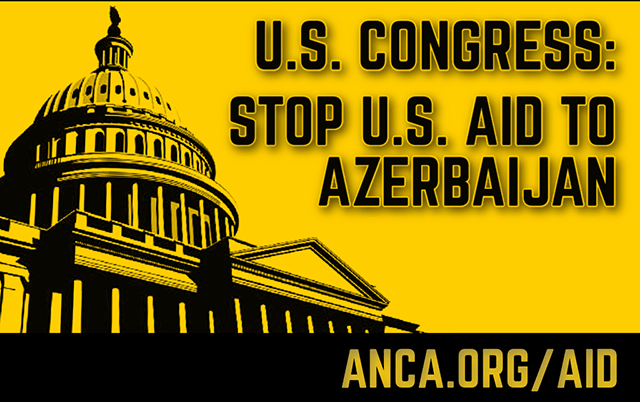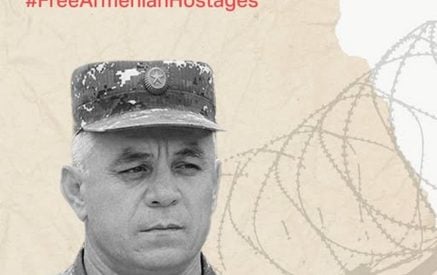ANCA Launches anca.org/aid Action Platform to Stop Aid to Azerbaijan, Strengthen Armenian Security
WASHINGTON, DC – With Azerbaijan’s blockade against Artsakh (Nagorno Karabakh) entering its third month and amid Aliyev’s escalating attacks on Armenian civilians, the ANCA is rallying community and coalition support for a Congressional Armenian Caucus request to stop U.S. military aid to Azerbaijan and send at least $150 million in assistance to Artsakh and Armenia, reported the Armenian National Committee of America (ANCA).
The request comes in the form of a letter to Appropriations Subcommittee on State-Foreign Operations Chairman Mario Diaz Balart (R-FL) and Ranking Member Barbara Lee (D-CA), who have already begun crafting the U.S. House version of the Fiscal Year 2024 (FY24) foreign aid bill.
“Well over a hundred thousand Armenians and allied Americans have already asked their U.S. Representatives to stop U.S. military aid to oil-rich Azerbaijan and send American humanitarian assistance to at-risk Artsakh – a powerful groundswell of grassroots activism from all fifty U.S. states and across the American political spectrum,” said ANCA Executive Director Aram Hamparian. “With Azerbaijan’s blockade now well into its third month and Aliyev steadily escalating his deadly aggression, we all need to step up – meeting with legislators, leveraging coalitions, and relentlessly writing, calling, and tweeting to demand concrete action from the elected officials who come asking for our votes every election.”
Read also
In a “Dear Colleague” letter sent to Members of Congress, Congressional Armenian Caucus founding co-chair Frank Pallone (D-NJ) noted, “Meaningful increases in assistance to Armenia for important priorities – including supporting populations displaced as a result of Azerbaijan’s aggression and impacted by the blockade of the Lachin Corridor – are essential to ensuring the stabilization of Armenia and Nagorno-Karabakh and paving a pathway towards lasting peace and security in the region.”
The letter includes the following budgetary requests:
— $100 million for security, economic, governance, and rule of law assistance to Armenia
— $50 million for Artsakh to provide a comprehensive assistance strategy and support the Armenian population of Nagorno-Karabakh in their rebuilding and resettlement efforts – along with an additional $2 million for humanitarian demining and UXO clearance.
— The suspension of all U.S. military and security aid to Azerbaijan and a State Department assessment of potential sanctions against Azeri officials found to have supported human rights abuses and war crimes.
— Language supporting the Administration’s efforts to secure the release of Armenian POWs illegally held by Azerbaijan.
The ANCA has launched an action platform – anca.org/aid – through which pro-Armenian advocates can write, tweet, and call their U.S. Representative to cosign the Congressional letter.
The full text of the Armenian Caucus letter is provided below.
#####
Dear Chairman Diaz-Balart and Ranking Member Lee:
We write to thank the Appropriations Subcommittee on State, Foreign Operations, and Related Programs for your longstanding support of the Republic of Armenia and the Republic of Nagorno-Karabakh (Artsakh). This includes the important language you incorporated into the Fiscal Year 2023 bill, providing $60 million in funding for Armenia, $2 million in demining assistance for Artsakh, and an assistance strategy for addressing the humanitarian needs from the Nagorno-Karabakh conflict. We ask that you build on these historic investments by considering the inclusion of the below provisions that will help strengthen America’s standing with partner countries in the region and hold Azerbaijan accountable for its ongoing hostilities in Artsakh and Armenia, including the ongoing blockade of the Lachin Corridor. The blockade has intentionally deprived Artsakh’s 120,000 Armenians of essential good, including food, fuel, medical supplies, electricity, and internet access.
Robust U.S. Assistance in Artsakh (Nagorno-Karabakh)
Azerbaijan’s inhumane blockade of Artsakh has left the region’s Armenian population on the brink of a humanitarian crisis and threatens to have lasting consequences on the region’s security. These cruel actions are taking place as the people of Artsakh continue to face severe hardships caused by the deadly 44-day war Azerbaijani forces launched in 2020. According to the United Nations High Commissioner for Refugees (UNHCR), 88 percent of the approximately 90,000 refugees displaced to Armenia were women, children, and the elderly. The U.S. Agency for International Development (USAID) also acknowledges that an “acute humanitarian crisis” continues for many of these families, including those who have been able to return to Artsakh. Unfortunately, the assistance provided to date by the U.S. government is wholly insufficient to address the overwhelming needs of these people.
The U.S. has historically promoted peace in Artsakh through U.S. government-funded landmine and unexploded ordnance clearance efforts and enabled rebuilding by investing in humanitarian assistance initiatives. We are requesting the State Department and USAID to deliver on the humanitarian assistance strategy mandated in the FY23 Appropriations Bill that lives up to our American humanitarian commitments. This vital package would help provide Armenian refugees with the aid, housing, food security, water and sanitation, health care, rehabilitation, and demining/UXO clearance they need to reconstruct their communities, rebuild their lives, and resettle their homes.
We urge you to include the following provisions in the body of the foreign aid bill:
· Of the funds appropriated under this heading, not less than $2,000,000 shall be made available for assistance in Nagorno-Karabakh to provide humanitarian demining and UXO clearance and $50,000,000 shall be made available to support rebuilding and resettlement efforts by Armenian victims in Nagorno-Karabakh, as well as address the long-term consequences of Azerbaijan’s blockade of the Lachin Corridor. Such assistance will help to meet basic human needs, including maternal healthcare, drinking water programs, as well as food and energy security and access to internet.
Security, Economic, and Governance Assistance for Armenia
The United States remains uniquely positioned to make important diplomatic advances in the South Caucasus. This is especially true in Armenia, an ancient nation with a modern democracy that continues to make democratic reforms in a region dominated by autocratic leaders. Providing significant assistance to Armenia will help make it more secure, bolster its democracy, sustain economic development, and stabilize its civil society. Providing security assistance to Armenia at this time is especially important as the Armenian people seek international assistance in protecting their sovereignty in the face of a constant Azerbaijani expansionism and authoritarianism.
This critical investment will build on past support for Armenia and Artsakh by the Subcommittee and will help strengthen the U.S.-Armenia strategic partnership, solidify our presence, and grow our influence in the region. We request the following language be included in this legislation:
· Of the funds appropriated by this Act, not less than $100 million shall be made available for Armenia prioritizing security assistance, economic development, private sector productivity, energy independence, democracy and the rule of law, and other purposes.
Prohibition on U.S. Military Aid to Azerbaijan and Sanctions
Despite assurances by the State Department that U.S. military assistance to Azerbaijan has not materially aided aggression against Armenia and Artsakh, it is abundantly clear that the continued waiver of Section 907 of the FREEDOM Support Act, amidst Azerbaijan’s unabated policy of aggression, has emboldened this violent pattern of behavior.
President Ilham Aliyev began his brutal 2020 assault on Artsakh not long after receiving over $100 million in security assistance through the Section 333 Building Partner Capacity Program in Fiscal Years 2018 and 2019. Azerbaijani forces used advanced Turkish drones, cluster munitions, and white phosphorus to indiscriminately attack homes, churches, and hospitals that killed thousands during the 44-day war. While a ceasefire halting the war was signed in November 2020, Azerbaijani forces continue their aggressive behavior in the region. This includes an assault on Armenia’s sovereign territory in September 2022, which saw Azerbaijani forces occupy over 50 square miles of territory and perpetrate horrific war crimes such as the execution of unarmed Armenian prisoners of war.
The blockade of the Lachin Corridor that Azerbaijan imposed on December 12, 2022, is designed to deny the region’s Armenian population access to essential humanitarian goods and clearly highlights the Aliyev regime’s unwillingness to seriously negotiate a fair, lasting peace deal. It is imperative that our government stops rewarding behavior that undermines our interests in ensuring a negotiated settlement for this crisis and that we respect the fundamental rights of Artsakh’s vulnerable Armenian population.
The Section 333 funding, along with other U.S. funding to Azerbaijan through the IMET and FMF programs breaks with an over two-decades long policy of parity in security assistance to Armenia and Azerbaijan, significantly increasing American support for the authoritarian Aliyev regime. In fact, according to a January 31, 2022, report by the Government Accountability Office (GAO), the State Department likely violated Section 907 of the FREEDOM Support Act in sending this and other assistance to Azerbaijan from 2014 to 2021. They did so by not properly consulting and communicating with Congress on what processes they used to determine whether U.S. aid to Azerbaijan could be used for offensive purposes against Armenia.
Holding Azerbaijan accountable is long overdue and must begin with Congress encouraging the Administration to fully enforce Section 907, restricting the Administration’s authority to waive this law, and enacting statutory prohibitions on any new or pending U.S. military or security aid to Azerbaijan. Congress must also urge the Administration to provide a report on Azerbaijan’s eligibility for military assistance under the Leahy Laws. We request that the following language be included in the final SFOPs bill:
· None of the funds appropriated or otherwise made available under this Act may be provided to the Government of Azerbaijan through U.S. military or security assistance programs. To inform the reevaluation of any future security assistance to Azerbaijan, the Secretary of State is directed to provide a report on Azerbaijan’s eligibility for military assistance programs under existing statutes. Additionally, the Secretary of State is directed to develop and submit to the Committee on Appropriations an assessment of the eligibility of Azerbaijani officials involved in the commissioning of human rights abuses and war crimes under existing statutes.
Armenian Prisoners of War and Captured Civilians
On November 9, 2020, Azerbaijan, Armenia, and Russia signed a tripartite statement to end the conflict in Nagorno-Karabakh, also known as Artsakh, where all parties agreed that the ‘‘exchange of prisoners of war, hostages, and other detainees as well as the remains of the fatalities shall be carried out.” However, the Government of Azerbaijan continues to detain an estimated 130 Armenian prisoners of war, hostages, and detained persons, misrepresenting their status to justify their continued captivity. We request that the following language be included in the final SFOPs bill:
· The Committee is concerned by Azerbaijan’s failure to immediately return all Armenian prisoners of war and captured civilians and, thus, (2) urges the Secretary of State to continue engaging at all levels with Azerbaijani authorities, including through the OSCE Minsk Group process, to make clear the importance of adhering to their obligations, under the November 9 statement and international law, to immediately release all prisoners of war and captured civilians.
Again, thank you for your leadership on the Subcommittee. We appreciate your consideration of these requests.























































